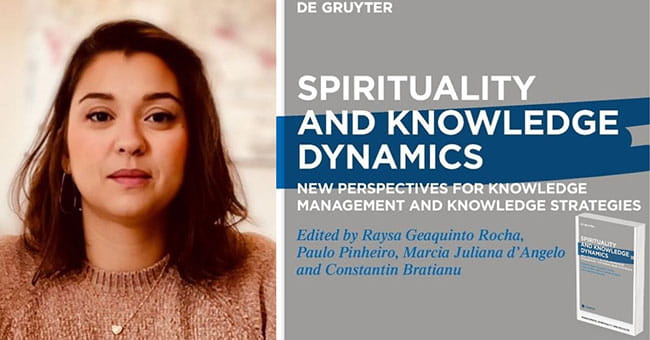Dr Raysa Rocha, lecturer in Organisation Studies and Human Resource Management at the Essex Business School, is co-editor of the new Open Access volume Spirituality and Knowledge Dynamics: New Perspectives for Knowledge Management and Knowledge Strategies, published by De Gruyter.
Read on to learn more about her work, which can be downloaded free of charge, and for Dr Rocha’s thoughts on Open Access.

Congratulations! How does it feel to have this collection published?
Thank you so much! It feels incredibly rewarding and exciting to see this collection come to fruition. This project has been a labour of love, bringing together diverse perspectives from scholars across the globe on the valuable intersection of spirituality and knowledge dynamics in organizations. Thanks to Essex's Open Access policies, seeing it published and available to readers worldwide is deeply gratifying. I hope it will spark new conversations and insights in this emerging area.
You chose to make use of the University’s Open Access Fund. Why is Open Access important to you and how do you think it will benefit your work?
Open Access is extremely important because it aligns with my values of making knowledge accessible to all. By removing financial barriers to accessing this work, we can ensure that researchers, practitioners, and students from all backgrounds and regions can benefit from these insights. I believe Open Access will significantly amplify the reach and impact of our work. It allows for wider dissemination, increased citations, and the potential for this research to influence practice in organizations globally. Additionally, Open Access supports a more equitable and collaborative approach to knowledge creation and sharing.
What advice about Open Access, or publishing in general, would you offer to colleagues?
For colleagues considering Open Access publishing, I would advise them to:
- Start early to consider Open Access options from the beginning of your project and factor it into your planning and budgeting
- Choose reputable publishers, ensure you're working with established publishers who have experience with Open Access
- Understand your rights, make sure to grasp the licensing terms and your rights as an author under Open Access
- Promote your work. Simply, take advantage of the increased visibility Open Access offers by actively sharing your published work.
The volume is called 'Spirituality and Knowledge Dynamics' and its blurb asks, 'Can spirituality unlock the full potential of your organisation?' We need to know more!
Absolutely! This question gets to the heart of our book's exploration. We posit that spirituality, when integrated thoughtfully into organizational practices, can indeed unlock tremendous potential. This isn't about imposing any particular belief system but rather about tapping into the deeper human needs for meaning, purpose, and connection that spirituality often addresses.
Our book examines how spiritual approaches can enhance knowledge creation, sharing, and application within organizations. We look at how spirituality can foster holistic decision-making, improve employee well-being and engagement, and drive innovation. For instance, practices like mindfulness can enhance cognitive flexibility and creativity. Spiritual values like compassion and interconnectedness can improve collaboration and knowledge sharing.
What forms can spirituality take in these studies?
The studies in this book reveal that spirituality takes on a fascinating array of forms in modern organizations and personal development. We see spirituality emerging as a fundamental knowledge field alongside rational and emotional knowledge, shaping how individuals and organizations approach decision-making and wisdom. It's also conceptualized as a personal journey towards one's best self and as a meta-story that weaves together our understanding of self, others, and the divine.
What's particularly exciting is how these abstract concepts are translated into tangible practices. For instance, at Clear Sky, a meditation centre in Canada, we see spiritual principles like Karma Yoga and Dāna being integrated into their organizational structure. This isn't just theory – it's a living experiment in how spirituality can shape workplace culture and practices.
We're also seeing spirituality influence entrepreneurship in profound ways. The book outlines a typology of spiritual entrepreneurs, from societal change-makers to environmentally-focused visionaries. There's even a case study of three individuals who developed a spiritual networking app based on A Course in Miracles, exemplifying how spiritual motivations can drive innovation and business creation.
In education, we're witnessing a shift towards what's called 'wisdom pedagogy,' which incorporates spiritual dimensions into higher learning. This isn't just happening in isolated pockets – the study covered 14 Finnish universities, suggesting a broader trend in how we approach knowledge and learning.
These examples clearly show that spirituality isn't just a personal, private matter anymore. It's becoming vital to how we work, learn, and create value in the world. From meditation centres to mobile apps, from classrooms to boardrooms, spirituality is being operationalized in ways that reshape our understanding of business, education, and personal development.
The book contains a lot of empirical insights – can you give us some of these real world examples?
This book's empirical insights are truly eye-opening. We have studies from Finnish universities to global corporations, all grappling with how to incorporate spirituality into their operations. One study interviewed 23 leaders about why they support organizational spirituality, offering us a rare glimpse into the motivations driving this trend at the highest levels of management.
A particularly vivid example comes from the Clear Sky meditation centre in Canada. This Buddhist-based organization serves as a practical example of implementing spiritual practices in an organizational setting. It uses concepts like Karma Yoga (compassionate service), Dāna (generosity), and Shadow Integration to create a spiritually-informed work environment.
We see a study in education that collected empirical data from Finnish Universities of Sciences. It provides insights into how wisdom pedagogy and its spiritual dimension are approached in higher education settings. Another study interviewed higher education teachers to understand how Higher Education Institutions address knowledge management and workplace spirituality.
The book also presents real-world categories of spiritual entrepreneurs, including societal, family-centric, environmental, religion-centric, antisocial, and opportunistic entrepreneurs. This typology offers a practical framework for understanding how spirituality influences entrepreneurial approaches.
One of the most concrete examples is the development of the ACIM Social app. This chapter provides a real-world example of spiritual entrepreneurship by creating an app that facilitates spiritual practice and knowledge sharing based on A Course in Miracles.
Lastly, the Faith at Work study provides real-world examples of how employees and managers enact spiritual knowledge and spiritual intelligence in their workplaces through specific practices and tools.
These examples demonstrate how spirituality is being practically applied and studied in various organizational, educational, and entrepreneurial contexts. This book offers a compelling look at the cutting edge of this transformation, backed by solid empirical research and vivid real-world case studies.
Who do you think will most benefit from your work and how do you plan to reach them?
I believe our work will benefit a diverse audience:
- Academics and researchers in management, organizational behaviour, and knowledge management will find new theoretical frameworks and empirical evidence to inform their work.
- Students in business, management, and related fields will gain a broader perspective on the role of spirituality in organizational life.
- Also, individuals with minor academic background can benefit from it. For example, leaders and managers can gain practical insights on how to integrate spirituality to enhance knowledge dynamics and organizational performance; HR professionals will find valuable strategies for improving employee well-being, engagement, and knowledge sharing; consultants in organizational development and knowledge management can use our findings to inform their client interventions.
Do you have any new projects lined up?
Yes, I'm currently involved in another exciting new project. Professor Joan Marques (Woodbury University's School of Business, California) has invited me to serve as a section editor for the upcoming Springer Encyclopedia of Diversity, Equity, Inclusion, and Spirituality. I oversee the 'Spirituality, DEI, and Knowledge Management' section.
This encyclopedia is a comprehensive reference work that explores the intersections of these worthy areas in our modern world. It also allows us to expand on many themes from my recent book, but on a larger scale and with a specific focus on how spirituality intersects with DEI initiatives and knowledge management practices.
The project involves scholars and practitioners worldwide, and I am eager to witness the progress of this project and its potential to impact our understanding of spirituality's role in fostering more diverse, fair, and inclusive organizations and societies.
Spirituality and Knowledge Dynamics: New Perspectives for Knowledge Management and Knowledge Strategies (co-edited with Paulo Pinheiro, Marcia d'Angelo, and Constantin Bratianu) can be downloaded now.
The Open Access Fund
The University of Essex's institutional Open Access Fund enables Essex authors to publish their research Open Access and to share their findings without barriers. You can explore your Open Access options with our dedicated forms: for books and chapters and for articles.








